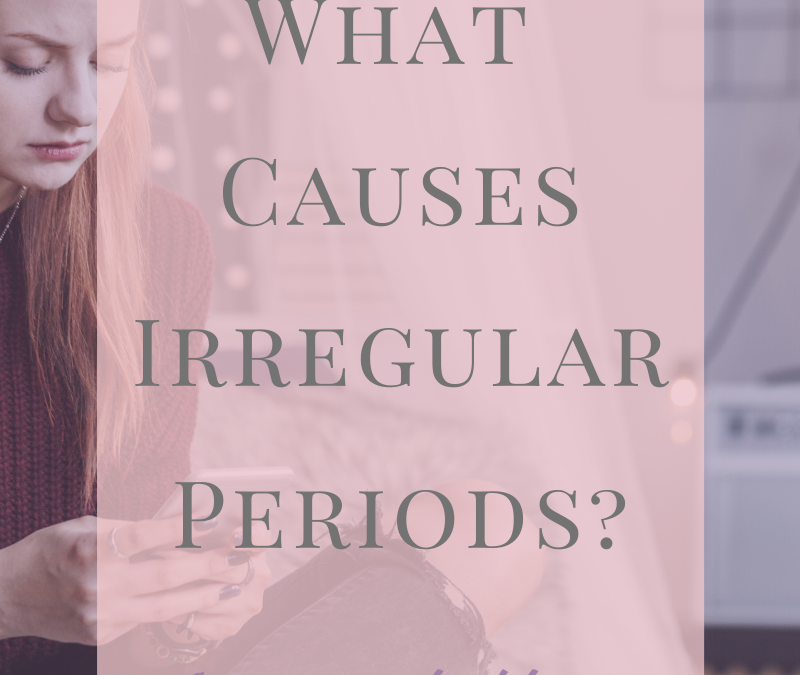When you understand the Basics of the Menstrual Cycle it becomes easy to identify irregular periods and abnormal cycles. Experiencing issues with absent periods or having prolonged cycles is a common sign that you are not ovulating properly. Failing to ovulate regularly can be associated with various complications. But, a common issue associated with ovulation dysfunction and irregular periods is polycystic ovary syndrome (PCOS). This disorder impacts many females between the ages of 15-44 and is the cause of infertility for many women. But, how exactly can you identify if your irregular periods are due to PCOS or some other issue?
Page Contents
Irregular Periods and PCOS

So, what exactly is PCOS and how does it affect your menstrual cycle and cause irregular periods? PCOS can be described as a complex reproductive disorder that disrupts the hormonal balance within the body. This hormonal imbalance involves the excess production of male androgens; mainly testosterone. In turn, the overproduction of testosterone slows down the production of female sex hormones estrogen and progesterone.
Consequently, this leads to follicles in the ovaries not maturing which inhibits ovulation. These hormonal imbalances are also responsible for decreasing the proliferation of endometrial tissue on the uterine wall. This causes the uterine wall to become thin and unable to support egg implantation which impacts fertility. In short, without ovulation and the uterine lining thickening during the proliferative phase, there is no need for you to have your period.
What Causes PCOS?
Medical professionals have been unable to pinpoint what causes PCOS. But, there are certain risk factors that have been associated with increasing one’s chances of developing PCOS.
Insulin Resistance
Insulin is an important hormone that is produced in your pancreas and it’s responsible for balancing blood sugar levels. It takes sugar (glucose) from carbohydrates and either use it for immediate energy or stores it in the cells for future use.
So, when your body becomes resistant to insulin this leads to elevated sugar levels which trigger the body to make more insulin. Since your body isn’t able to uptake insulin properly this can trigger excess androgen production. Thus leading to complications with ovulation, irregular menstrual cycles, and irregular periods.
Chronic Inflammation
Experiencing low-grade inflammation may contribute to hormonal imbalances in the form of excess androgen production. It may also cause issues with polycystic ovaries. This occurs when small fluid-filled follicles or cysts develop on the ovaries. When this happens the ovaries or unable to release an egg, therefore impairing ovulation. It’s important to note that not every woman with PCOS will have an issue with polycystic ovaries.
Heredity
It is estimated that 20-40% of women with PCOS have a mother or sister that is affected. Therefore, your risk of developing PCOS is increased if your sibling or mother has it. Meaning your risk of PCOS is inherited and your risk of developing the metabolic abnormalities associated with PCOS also increases. But, there is no specific PCOS gene that is known to cause or contribute to PCOS.
Excess Male Androgens
Hormonal imbalances that lead to the ovaries producing high levels of male androgens may contribute to the onset of PCOS. Overproduction of male androgens also contributes to side effects such as acne, and unwanted hair growth.
Health Complications Associated with PCOS

For many sufferers, PCOS is a whole-body disease. Meaning in addition to ovulation dysfunction and irregular periods there are other complications associated with PCOS.
Common complications include:
- Infertility
- Type 2 Diabetes
- Metabolic Syndrome
- Sleep apnea
- Depression and anxiety
- Abnormal uterine bleeding
- Endometrial cancer
While there is no cure for PCOS there are a variety of ways you can manage it. Working with a qualified medical professional should be your first step. Additionally, making lifestyle changes by improving your nutrition, exercise and wellness habits can help manage PCOS and reduce complications.
Do You Have PCOS?
In addition to irregular periods and cycles, there are signs and symptoms that can help you identify if PCOS may be an issue for you.
- Irregular or absent periods
- Spotting in between periods
- Heavy menstrual flow during your period
- Prolonged menstrual cycles that extend beyond 32 days
- Infertility
- Excessive hair growth on the face, chest, back, and buttocks
- Abnormal weight gain
- Thinning hair
- Acne
It’s important to understand that symptoms vary from person to person. Additionally, you may have all or only a few of these symptoms. But, it’s important to schedule an appointment with your OB/GYN to discuss what you’ve been experiencing in order to obtain a proper diagnosis.
What to Discuss At Your Appointment

Sometimes going to the doctor can be a traumatizing and frustrating experience. Especially, if you’ve been trying to identify what’s causing these symptoms for a long time. Doing a little prep work beforehand can help make these appointments better and help you get the proper care you need.
First off, keep a wellness journal and track all the things. Jot down your symptoms making sure you include the date of onset, how often they occur, and how severe they are. Track your period and keep up with how long your menstrual cycles are, how often you have your period, what your flow is like and if you have spotting in between periods. Secondly, you will want to discuss your family history of PCOS with your mother and siblings so you can discuss this with your doctor during your appointment. Lastly, do your research to find a doctor that specializes in PCOS and knows what to look for and how to identify it.
During your appointment ask open-ended questions and hold your doctor to task. If they are dismissive and refuse to run certain tests demand they document this in your chart so you can get a second opinion. Don’t be afraid to speak up and advocate for your health.
Focus on What’s Important
Experiencing irregularity with your menstrual cycle and/or period is definitely a sign that something is up with your reproductive health. Don’t wait and hope for things to get better instead be proactive. Take the time to properly track and monitor your symptoms, schedule an appointment with your doctor, and get to the bottom of what’s causing your irregular periods. Let’s keep the conversation going. Are you a woman with PCOS that has some insight you could share? Or perhaps you would like to share your unique experience. I would love to hear and learn about it either way. Leave me a comment below and let’s talk!
About the Author.
 Hi, my name is Kathleen but you can call me Kat. I’m a health and wellness professional turned freelance writer and content creator. My personal struggle with infertility, endometriosis and ovarian cysts made me realize that there just isn’t enough information out there available to women to help them learn more about PCOS, endometriosis, adenomyosis, or fibroids. Basically there’s a serious lack of information concerning a variety of women’s health topics and issues and well I got fed up. I decided to be the change and created this blog in an effort to spread awareness and advocate for women’s health issues. It has now become my passion to educate and empower women to redefine their health and be their own advocate. You can find me on YouTube and Instagram. If you take the opportunity to visit me on my other platforms don’t hesitate to leave a message, I would love to hear from you!
Hi, my name is Kathleen but you can call me Kat. I’m a health and wellness professional turned freelance writer and content creator. My personal struggle with infertility, endometriosis and ovarian cysts made me realize that there just isn’t enough information out there available to women to help them learn more about PCOS, endometriosis, adenomyosis, or fibroids. Basically there’s a serious lack of information concerning a variety of women’s health topics and issues and well I got fed up. I decided to be the change and created this blog in an effort to spread awareness and advocate for women’s health issues. It has now become my passion to educate and empower women to redefine their health and be their own advocate. You can find me on YouTube and Instagram. If you take the opportunity to visit me on my other platforms don’t hesitate to leave a message, I would love to hear from you!
References.
Mayo Clinic: Polycystic Ovary Syndrome (PCOS)
Mayo Clinic: Metabolic Syndrome
Office on Women’s Health, www.womenshealth.gov; Polycystic Ovary Syndrome
Healthline: Polycystic Ovary Syndrome (PCOS): Symptoms, Causes, and Treatment, Medically Reviewed by Debra Sullivan PhD, MSN, RN, CNE, COI; Written by Stephanie Watson, September 1, 2018
Medical News Today: How Polycystic Ovary Syndrome Affects Fertility, Medically reviewed by Debra Rose Wilson PhD, MSN, RN, IBCLC, AHN-BC, CHT; Written by MaryAnn De Pietro CRT, January 17, 2019
[gravityform id=”1″ title=”true” description=”true”]






